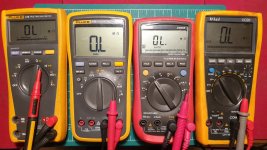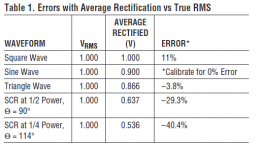I'm in the market for a true RMS multimeter. I would like to be able to measure audio signals accurately but my knowledge about DMMs is rather limited.
I don't have unlimited budget but I think I can stretch it to €200 or thereabouts. Obviously the cheaper the better as long as it's not crap.
Any recommendations? Maybe the Fluke 115?
Thanks!
I don't have unlimited budget but I think I can stretch it to €200 or thereabouts. Obviously the cheaper the better as long as it's not crap.
Any recommendations? Maybe the Fluke 115?
Thanks!
Maybe I should also mention that I already own this mete, which is OKish I guess/ hope...
https://axiomet.eu/de/en/product/axiomet/digital-multimeters/ax-190a/112609/
https://axiomet.eu/de/en/product/axiomet/digital-multimeters/ax-190a/112609/
I have a 115 at work for use as part of a safety tester for doing leakage current checks. . For what I use it for it is just able to do the job but I would not choose it for more exacting work. At home I use an older Fluke -a model 189. If you can go up the food chain in the Fluke lineup you will get a much more versatile meter. If you can find a used 187 or 189 they are excellent meters and seem to last for decades. After over 40 years of using DVM’s almost daily the brand that has stood out is Fluke. Buying one is an investment that will pay off for decades.
Why "True RMS"? Are you measuring non-Sines?
Anything except SCR dimmers, an average-reading meter scaled in RMS is really really accurate.
Also easier to reach high frequencies with Average. That used to be a problem for audio, maybe not now.
Anything except SCR dimmers, an average-reading meter scaled in RMS is really really accurate.
Also easier to reach high frequencies with Average. That used to be a problem for audio, maybe not now.
If its audio signals being measured it won't be SCR waveforms, just sine (not an issue) or square (big issue if not true-RMS!)Anything except SCR dimmers, an average-reading meter scaled in RMS is really really accurate.
Well, that's a good point. I don't feel proud but I never thought about it. Almost always I measure sines.
So do you reckon that the current meter I have is OK for what I need?
On the other hand, what's the purpose of a TRMS meter? Is it for measuring more complex waveforms?
@Bfpca Do you suggest that the 115 won't be sufficient for my needs and if so, why?
A 179 or 189 would be great indeed but my budget doesn't allow it at the moment. Also, buying second hand from an individual is not an option as I need an invoice.
Thank you all for your comment! 🙂
So do you reckon that the current meter I have is OK for what I need?
On the other hand, what's the purpose of a TRMS meter? Is it for measuring more complex waveforms?
@Bfpca Do you suggest that the 115 won't be sufficient for my needs and if so, why?
A 179 or 189 would be great indeed but my budget doesn't allow it at the moment. Also, buying second hand from an individual is not an option as I need an invoice.
Thank you all for your comment! 🙂
Take a look at the UNI-T meters, i bought a UT61E model for under $100 and honestly i prefer it to my Fluke 175. It just works.
https://www.uni-trend.com/meters/ht...ers/DigitalMultimeters/UT61_Series/UT61E.html
https://www.uni-trend.com/meters/ht...ers/DigitalMultimeters/UT61_Series/UT61E.html
That Brymen BM869s looks good. I was actually considering it as well as the uni-t although for some undefined reason I prefer the Brymen.
@mcandmar Do you own one and if so, are you happy with it?
To be honest, the main reason I would go for Fluke is that AFAIK flukes are very good in being kept calibrated for many years, while I'm not sure if that's the case with other meters.
But then again, as I already said, I don't know much about meters....
@mcandmar Do you own one and if so, are you happy with it?
To be honest, the main reason I would go for Fluke is that AFAIK flukes are very good in being kept calibrated for many years, while I'm not sure if that's the case with other meters.
But then again, as I already said, I don't know much about meters....
For the money its great. Don't get me wrong, the Fluke 175 is a better quality and more accurate meter, but its three times the price. The UNI-T has more functions and is more versatile, and does everything the Fluke can do.
Put it this way, if i want to match resistors and want them to be exactly 49.9ohms on the button, or need to know exactly how many mA a circuit is using i will reach for the Fluke as i have more trust in its absolute accuracy. For everything else i use the UNI-T.
I have also found cases where the 175 wont work where the UT61 will, for example was calibrating a take deck recently and had to measure 400hz and 10khz signals at a few hundred milivolts, the Fluke would'nt play ball and give me a reading where the UNI-T worked flawlessly.
The Fluke 17B i bought from AliExpress when they were under $100, great 2nd meter but isn't true RMS. Then finally the Vici, what an absolute steaming pile of dog poo, don't buy one of those. Or anything that has those transistor testers built in, dead give away its a rubbish meter.
I think those Brymens are the meters that Dave Jones in the EEV Blog resells. I have heard good things about them but never used one myself.
Put it this way, if i want to match resistors and want them to be exactly 49.9ohms on the button, or need to know exactly how many mA a circuit is using i will reach for the Fluke as i have more trust in its absolute accuracy. For everything else i use the UNI-T.
I have also found cases where the 175 wont work where the UT61 will, for example was calibrating a take deck recently and had to measure 400hz and 10khz signals at a few hundred milivolts, the Fluke would'nt play ball and give me a reading where the UNI-T worked flawlessly.
The Fluke 17B i bought from AliExpress when they were under $100, great 2nd meter but isn't true RMS. Then finally the Vici, what an absolute steaming pile of dog poo, don't buy one of those. Or anything that has those transistor testers built in, dead give away its a rubbish meter.
I think those Brymens are the meters that Dave Jones in the EEV Blog resells. I have heard good things about them but never used one myself.
Attachments
True RMS -- why you need it -- this chart from the Analog Devices/Linear Technologies LT1968 datasheet
Very interesting. Thanks!
I thought that was obvious.If its audio signals being measured it won't be SCR waveforms,
Yet some folks "never thought about it".
THE good excuse is trimming lamp dimmers. As I worked next to a theater in days of giant SCR/Triac dimmers, I have wished for TRMS. Before such things were affordable. However, use you brain. The equivalent average reading of chopped waveforms can be computed. Or even determined experimentally with resistor and thermometer.
I have NO idea why I would want an audio square, or the RMS of a square-- anyway a peak meter tells you that if you discount the "RMS calibration", or use a 'scope. (Yes I have used a lot of audio squares in synth work, but not as final product, just a rich soup for filtering.) The only reasons I would be measuring Triangles are for slope or peak clipping; 'scope work, not meter.
I picked up a Bryman BM789, which works well. I had to order from Europe: https://brymen.eu/shop/bm789/
It has 100kHz BW & true RMS
I purchased from here: https://www.welectron.com/Brymen-BM789-Multimeter_1
Specification Datasheet: https://www.welectron.com/mediafiles/datasheets/brymen/Brymen_BM780_Datasheet.pdf
User manual: https://www.welectron.com/mediafiles/manuals/brymen/Brymen_BM780_Manual.pdf

It has 100kHz BW & true RMS
I purchased from here: https://www.welectron.com/Brymen-BM789-Multimeter_1
Specification Datasheet: https://www.welectron.com/mediafiles/datasheets/brymen/Brymen_BM780_Datasheet.pdf
User manual: https://www.welectron.com/mediafiles/manuals/brymen/Brymen_BM780_Manual.pdf
Here is a whole thread (263 replies) on the Brymen BM789: https://www.eevblog.com/forum/testgear/brymen-bm789/msg3683320/#msg3683320
The Brymen BM789 is a newer model than the BM869 with different set of tradeoffs, but priced well & good for 100kHz BW
The Brymen BM789 is a newer model than the BM869 with different set of tradeoffs, but priced well & good for 100kHz BW
Multimeter spreadsheet & over 500 posts: https://www.eevblog.com/forum/testgear/multimeter-spreadsheet/
https://rishabh.co.in/product/289/rishabh-616The company is reputed, I have no experience with this model.
True RMS even with distorted wave form, and frequency measurement to 10 MHz are claimed.
True RMS even with distorted wave form, and frequency measurement to 10 MHz are claimed.
The Rishbh 616 does NOT seem to specify the AC V bandwidth. It does have a frequency counter specification of 10MHz. It has a 4 digit 6600 count display
The Brymen 789 has a AC V bandwidth of 100kHz & has 60,000 count 4 5/6 display. The specifications are much more detailed.
Specification Datasheet: https://www.welectron.com/mediafiles/datasheets/brymen/Brymen_BM780_Datasheet.pdf
The Brymen 789 has a AC V bandwidth of 100kHz & has 60,000 count 4 5/6 display. The specifications are much more detailed.
Specification Datasheet: https://www.welectron.com/mediafiles/datasheets/brymen/Brymen_BM780_Datasheet.pdf
Here are a few measurements with the Brymen , sorry but only in german language :
https://www.analog-forum.de/wbboard...besten-neu-kaufen/&postID=1836772#post1836772
https://www.analog-forum.de/wbboard...besten-neu-kaufen/&postID=1836772#post1836772
- Home
- Design & Build
- Equipment & Tools
- True RMS DMM

